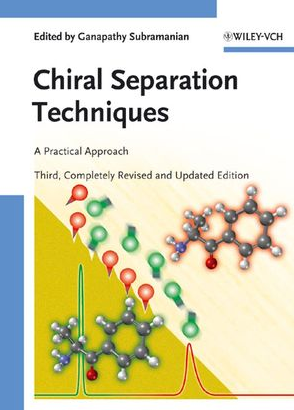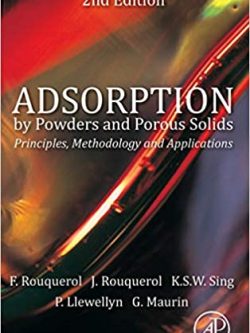Chiral Separation Techniques: A Practical Approach 3rd Edition, ISBN-13: 978-3527315093
[PDF eBook eTextbook]
- Publisher: Wiley-VCH; 3rd edition (December 15, 2006)
- Language: English
- 641 pages
- ISBN-10: 3527315098
- ISBN-13: 978-3527315093
Chirality describes the fact that a particular molecule can have a “right-hand” structure or its mirrored “left-hand” structure, both of which may display very different characteristics. For example, a “right-hand” structure can be an important active substance for a drug while its “left-hand” variation is highly toxic. For this reason, chiral separation techniques are indispensable for production and safety testing in biotechnology, food and pharmaceutical industries.
Thoroughly revised, with either entirely new or completely updated contents, this is a practical manual for the small and large-scale preparation of enantiomerically pure products. The result is a vital resource for meeting the highest purity standards in the manufacture of chiral pharmaceuticals, food additives and related compounds. All the approaches covered here are highly relevant to modern manufacturing and quality control schemes in the pharmaceutical and biotech industries, addressing the increasingly important issue of drug safety in view of tougher regulatory standards worldwide.
Content:
Chapter 1 Method Development and Optimization of Enantioseparations Using Macrocyclic Glycopeptide Chiral Stationary Phases (pages 1–28): Thomas E. Beesley and J. T. Lee
Chapter 2 Role of Polysaccharides in Chiral Separations by Liquid Chromatography and Capillary Electrophoresis (pages 29–97): Imran Ali and Hassan Y. Aboul?Enein
Chapter 3 Analytical and Preparative Potential of Immobilized Polysaccharide?Derived Chiral Stationary Phases (pages 99–134): Tong Zhang and Pilar Franco
Chapter 4 Chiral Separations Using Supercritical Fluid Chromatography (pages 135–154): Karen W. Phinney and Rodger W. Stringham
Chapter 5 Chiral Separation by Ligand Exchange (pages 155–179): Gerald Gubitz and Martin G. Schmid
Chapter 6 Advances in Simulated Moving Bed Chromatographic Separations (pages 181–202): Pedro Sa Gomes, Mirjana Minceva, Luis S. Pais and Alirio E. Rodrigues
Chapter 7 Less Common Applications of Enantioselective HPLC Using the SMB Technology in the Pharmaceutical Industry (pages 203–273): Stefanie Abel and Markus Juza
Chapter 8 Enantiomer Separation by Chiral Crown Ether Stationary Phases (pages 275–299): Myung Ho Hyun
Chapter 9 Enantioselective Separation of Amino Acids and Hydroxy Acids by Ligand Exchange with Copper(II) Complexes in HPLC (Chiral Eluent) and in Fast Sensing Systems (pages 301–331): Rosangela Marchelli, Roberto Corradini, Gianni Galaverna, Arnaldo Dossena, Francesco Dallavalle and Stefano Sforza
Chapter 10 Enantiomer Separation by Capillary Electrophoresis (pages 333–368): Gerhard K. E. Scriba
Chapter 11 Counter?Current Chromatography in the Separation of Enantiomers (pages 369–397): Eva Perez and Cristina Minguillon
Chapter 12 Separation of Enantiomers Using Molecularly Imprinted Polymers (pages 399–431): Borje Sellergren
Chapter 13 Enantioselective Biosensors (pages 433–439): Raluca?Ioana Stefan?van Staden, Jacobus Frederick van Staden and Hassan Y. Aboul?Enein
Chapter 14 Chiral Analysis in Capillary Electrochromatography (CEC) and CEC Coupled to Mass Spectrometry (pages 441–504): Jie Zheng and Shahab A. Shamsi
Chapter 15 Chiral Analysis Using Polymeric Surfactants in Micellar Electrokinetic Chromatography (MEKC) and MEKC Coupled to Mass Spectrometry (pages 505–560): Syed A. A. Rizvi and Shahab A. Shamsi
Chapter 16 Polarimeter Chiral Detectors in Enantioseparations (pages 561–584): Gary W. Yanik
Chapter 17 Preparative Chiral Chromatography – a Powerful and Efficient Tool in Drug Discovery (pages 585–600): Shalini Andersson
With over 30 years experience in both industry and academia, Ganapathy Subramanian is a biotechnology consultant working in the application and development of processing, purification methodologies and chromatographic systems for large-scale use in environmental science, food science, perfumery cosmetics and pharmaceuticals. He has also taught extensively in the area of food and medical technology.
A chemistry graduate from Madras, India, he gained his doctorate from the University of Glasgow for work on natural products, and his main research interests lie in the utilization of natural material separation processes and bio-conversions.
Dr. Subramanian has written and edited a number of books and articles in the field of biotechnology. For the last 10 years, he has been organizing conferences promoting the integration and knowledge exchange between academia and industry.
What makes us different?
• Instant Download
• Always Competitive Pricing
• 100% Privacy
• FREE Sample Available
• 24-7 LIVE Customer Support






Reviews
There are no reviews yet.